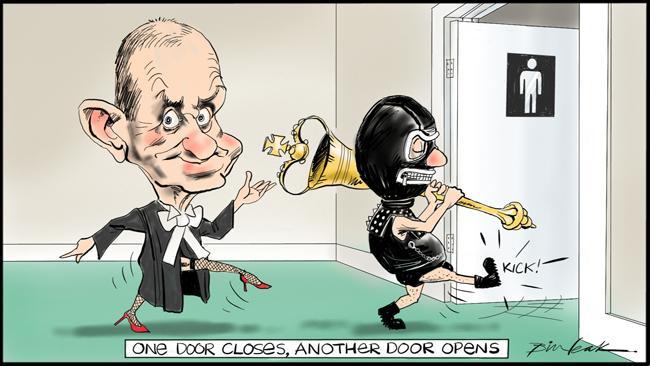
THE Gillard government has only itself to blame if the scandals involving Peter Slipper lead it to lose its parliamentary majority and it finds itself out of power.
Labor and Coalition MPs have known for years about a series of allegations concerning Slipper's personal peccadillos and claims he rorted his entitlements.
Yet, in a politically craven yet ultimately mind-numbingly stupid move, the government decided to lure Slipper from the opposition benches with the prize of the Speakership. A senior cabinet minister told me at the time this was a highly risky move that would damage the government's credibility and could come back to haunt them. It has.
The Coalition cannot escape culpability, either. They continued to endorse Slipper at election after election. Claims by John Howard's former staff and ministers that they "cannot recall" allegations against Slipper defy reality. Of course they knew. Slipper was one of their own and they protected him and supported him.
Although everybody knew about the allegations, the government hoped that making Slipper Speaker would provide it with an extra parliamentary vote as it would reduce the opposition's numbers.
It enabled Julia Gillard to abandon her agreement with independent MP Andrew Wilkie on poker machine reform, which could have cost the government seats at the next election. But in fixing one problem -- caused by a promise to Wilkie that should never have been made -- the Prime Minister created a series of other problems.
It reinforced the perception that Gillard would do anything it took to stay in power. Break promises, engage in dirty deals, backstab and cut loose anyone -- all in the naked pursuit of power.
It reminded voters that Gillard couldn't be trusted. After promising never to challenge Kevin Rudd for the prime ministership, she did. After promising never to introduce a carbon tax, she did. The public will forgive many things, but lies and broken promises are beyond the pale.
Wilkie exited the agreement to support the government in parliament and may support a no-confidence motion that could make the government fall.
Just as both sides of politics knew about Slipper, everybody inside the Labor Party knew about the systemic corruption in the Health Services Union and the allegations against former HSU national secretary, now Labor MP, Craig Thomson before he was preselected to contest the seat of Dobell at the 2010 election.
The allegations against Thomson are so extensive, so damning and so comprehensively reported that it is absurd for Gillard to continue to express her "full support" of the scandal-plagued MP.
The Labor Party has disaffiliated the HSU. The ACTU and Unions NSW have suspended the union. Labor forced HSU east branch secretary and national president Michael Williamson -- who also faces allegations of systemic corruption -- to stand aside from his party positions. Yet Gillard seems oblivious to what is blindly obvious to everyone else.
Thomson should have been suspended from the party and made to sit on the cross bench until the allegations against him were dealt with. But the government is so worried about losing his vote that they have now attached themselves to a scandal with a stench that has done great damage to the Labor brand.
It is another case of trying to hold on to power at all costs, no matter how damaging it is to government and the party. Because if Thomson's parliamentary vote is lost then, again, the government could fall.
On Friday, Aged Care Minister Mark Butler released a well-designed aged-care reform package that won widespread support. The government hoped it would help gain political momentum through to the budget and into the winter break. But that has now been damaged by a dirty deal with Slipper that has come back to haunt them.
It follows the Australia Network tender debacle just a few weeks ago that was exposed in a damning Auditor-General's report. It highlighted the inner workings of a dysfunctional cabinet and a group that not only lacks political skills but sound administrative ability.
The report exposes the extent to which ministers corrupted an independent decision-making process, ignored expert advice and backstabbed, squabbled and undermined each other to deliver an outcome that was already predetermined.
In the process, they went close to breaking the law that they were meant to uphold. The report reveals a letter sent from Gillard to the cabinet that her own department said might be advocating illegal activity.
The list of other extraordinarily poor judgment calls is too long to mention, but they include: forming an alliance with the Greens, the broken pledge on a carbon tax, the promised pokies reforms, multiple refugee policy backflips, the mining tax consultation and implementation, the gay marriage debate at the ALP national conference, substantially ignoring a report on internal party reform, the promise of "the real Julia", the Australia Day kerfuffle and the December ministerial reshuffle.
These were the issues that forced 31 MPs to vote against Gillard in the leadership ballot a few months ago. Opposition to Gillard has since swelled in size, but there is no immediate mood to revisit the leadership. Still, discontent within the caucus is festering. But it is not only Gillard that is the problem.
One of the great mysteries of modern Labor is how a group of the most highly talented, intelligent and experienced political professionals can be collectively so hopeless.
The cabinet, back bench and senior staff includes people who have devoted their lives to politics: party secretaries, staffers, strategists, campaigners, union organisers. Politics is their craft. It is what they do best. They have devoted their lives to politics. But time and time again their judgment is found wanting.
It may explain why the government is seen as almost too political: power-hungry, accustomed to game playing and obsessed with short-term tactics rather than long-term strategy.
If it focused more on sound administration, good policy and the national interest, then perhaps a raft of policy problems, poor judgment calls and scandals could have been avoided.


